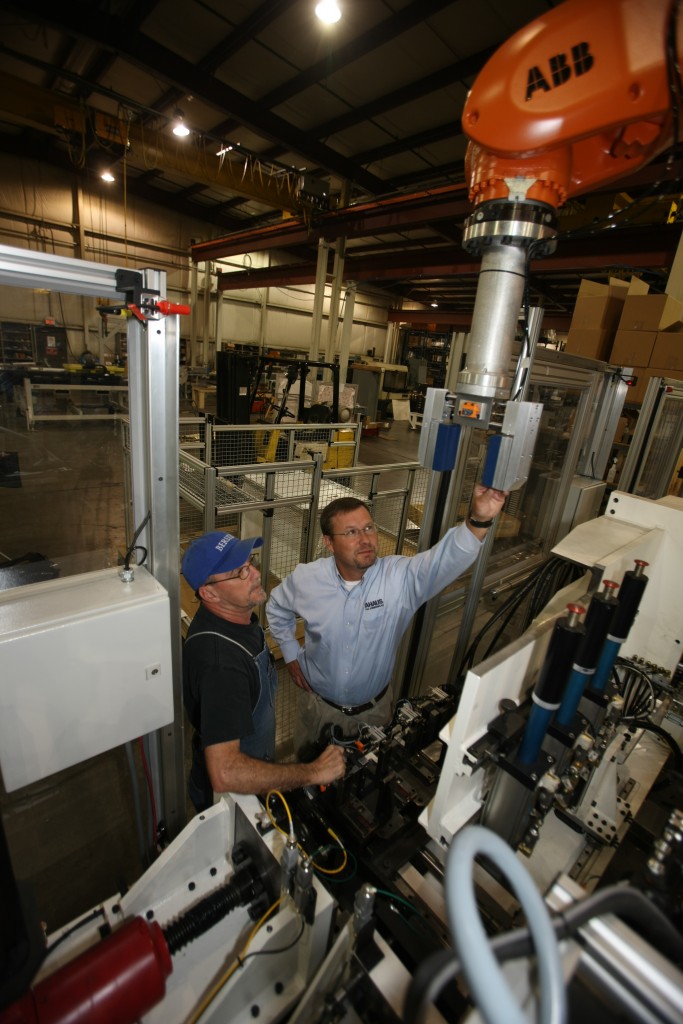
Ahaus Tool engineers its own workforce
Workforce development is an essential ingredient in today’s manufacturing world.
But, it’s far from a new concept. Apprenticeships and high school tech-ed programs have long served as cornerstones for developing employees.
So have trade schools and, of course, on-the-job training.
Ahaus Tool & Engineering of Richmond has been developing its own machinists and engineers since the late 1970s. Many of its current 90-plus employees were originally drawn there through technical education programs at Richmond and other high schools in the area.
More than half of the machinists and toolmakers at Ahaus Tool are graduates of its registered U.S. Apprentice Program, reports President Kevin Ahaus.
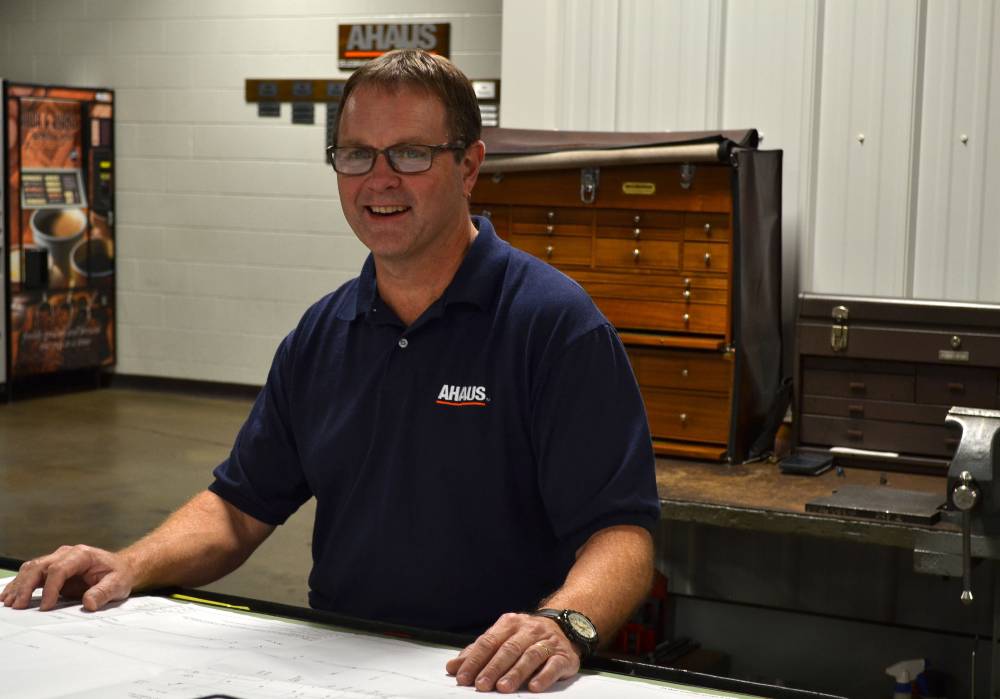
Mark Moistner stands as a shining example for the success of the program.
He came to the 70-year-old company straight out of Lincoln High School in 1979 and now serves as an apprentice recruiter as well as a toolmaker.
He is the latest in a string of apprentice coordinators that have helped Ahaus recruit good candidates for the last 20 years, says Kevin Ahaus. All have been past apprenticeship graduates.
“My job is to get talent to Ahaus,” Moistner said.
He does that and more. “He’s top notch in everything. He works with the students, makes sure they get the right classes,” says Rick Ahaus, chairman of the board and former CEO at Ahaus Tool. “He’s great at building sophisticated equipment. He knows how to work with people and with customers. If you had 100 of them, you could let the shop run itself.”
People such as Moistner are helping bridge the worlds between machinists and Mac computers, between lathes and lasers.
Ahaus Tool’s world keeps expanding. Solid growth has been recorded in the last four years and the company plans to create 11 jobs — and increase total employment to well over 100 — after adding assembly space onto its plant at 200 Industrial Parkway.
The $700,000 project broke ground on Sept. 9.
Ahaus Tool has been awarded a grant of $22,000 from the Economic Development Corporation of Wayne County that will be used mainly for job training.
Ahaus defines itself on its website as a “leading provider of workholding solutions, automation equipment and other custom machining services.”
Everything is computer-controlled now. “It’s amazing,” says Rick Ahaus. “I am an electrical engineer by education, yet the whole technical world passed me by.”
He lives much of the time now in Florida. Ahaus Tool is run by Kevin Ahaus and Vice President Jeff Sheridan in the 65,000-square-foot manufacturing site in southeast Richmond.
With the new expansion the plant will grow by 9,000 square feet. This is the fourth addition since the company built there in 1979.
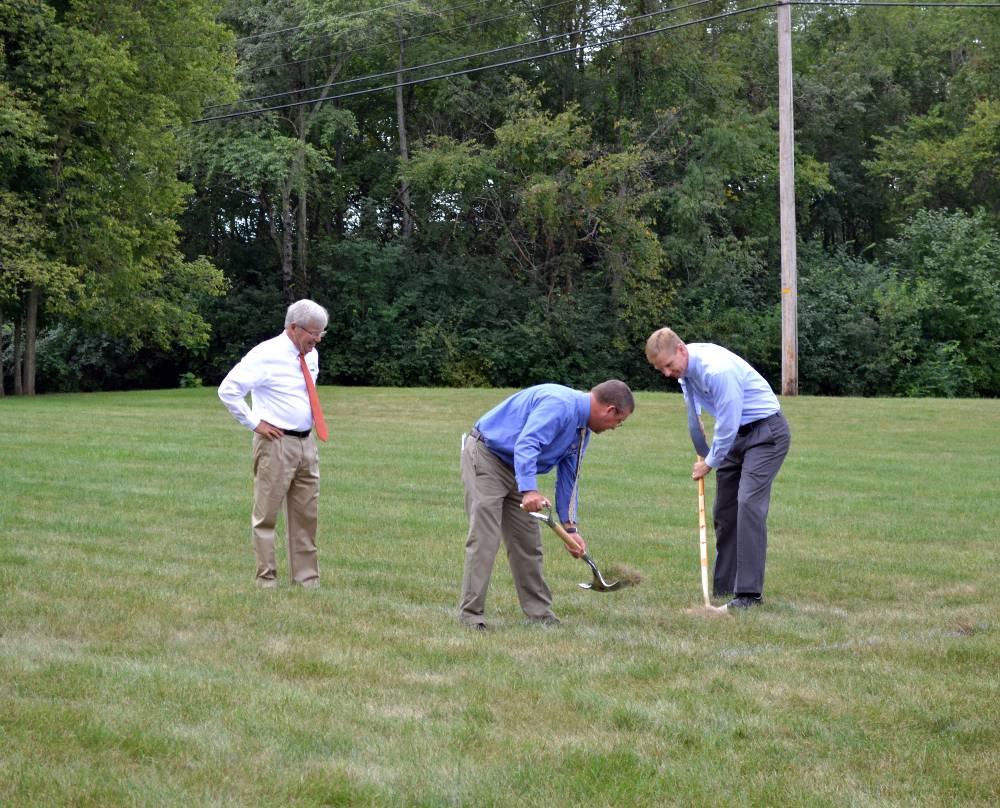
“It is great to be expanding again,” Kevin Ahaus said in a release from the EDC. “It has been 21 years since our last addition and the new assembly space will be valuable to compete for larger assembly and automation systems.”
Valerie Shaffer, president of the EDC of Wayne County praised Ahaus Tool for its workforce development in the release: “They are a perfect example of a company that has openings that pay better than average wages and require highly skilled workers. The demand for skilled workers is growing in our region with numerous employers stating they have job openings and need skilled workers to fill them.”
Most manufacturers today demand a trained workforce that is already high-tech and certified — often through community colleges, employment agencies and governmental programs.
When Rick Ahaus’ grandfather, William, started Ahaus Tool in a two-car garage behind his house in 1946, the company was one of dozens in the trade. “Richmond had a lot of toolmakers in a lot of places,” Rick Ahaus says.
There were a lot of experienced workers, too, so companies could afford to have hiring processes that were more streamlined than today. “You would hire a guy in the morning and if he didn’t meet a standard by noon, he was probably fired,” Ahaus says.
But, manufacturing and training needs were changing in the late 1970s. Things were getting more technical and the pool of potential employees was shrinking.
Rick Ahaus saw the necessity of a strong apprentice program after earning a degree in electrical engineering from the General Motors Institute.
“I always thought we could create a co-op program for tool-and-die makers,” he remembers. “If we work together on this, we can create a complete workforce.”
He envisioned the program working through Ivy Tech Community College, where the students would earn two-year degrees and be certified to work in his industry. Nearly 40 years later, Ivy Tech does exactly that with programs such as Manufacturing Matters that truly are cooperative efforts of manufacturers, educators and economic development groups.
Ahaus Tool’s longtime support for Ivy Tech is recognized with its name on the Machine Tool Lab on campus.
Ahaus says his first co-op efforts derailed because the top tool-and-die owner at that time told him: “I don’t want to train and have other businesses steal them,” Ahaus recalls. “If we have enough, it doesn’t matter.”
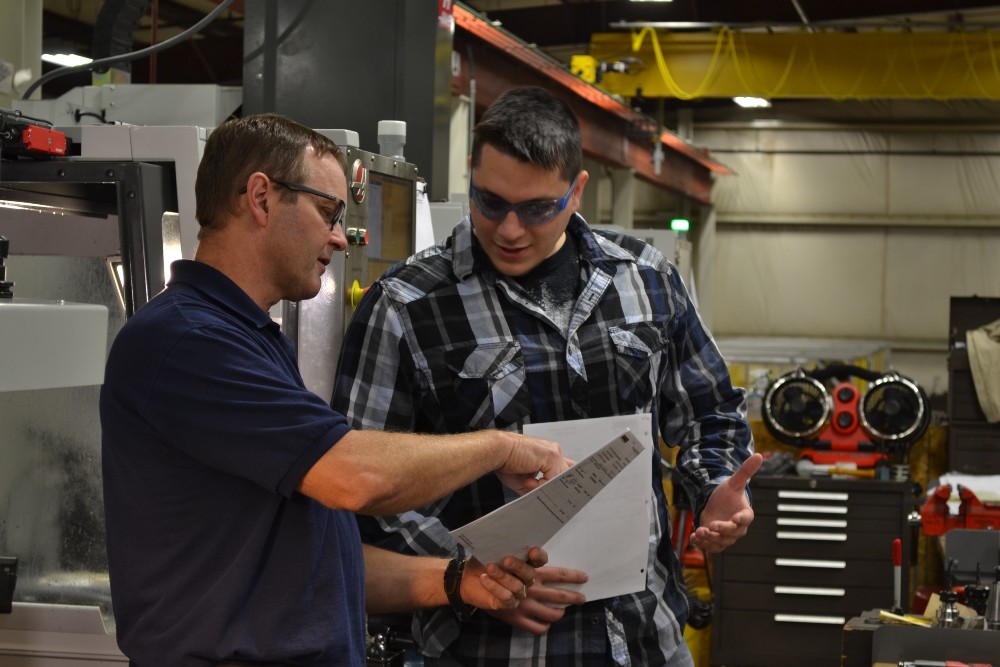
But, training mattered a lot to Ahaus. And it’s mattered a lot to the tool company’s bottom line. “If there is any one thing that has helped with our success, it’s been that we are willing to train people,” he says. “We try to have five apprentices all the time. We also get co-op students from high school.”
Training will keep advancing at Ahaus Tool. “From our experience with the machinist and toolmaker apprentice programs, we are looking to develop a new program in machine design and more competency-based training for future Ahaus team development,” Kevin Ahaus says.
Moistner is thrilled that he came to Ahaus Tool, but it was a stroke of fortune that got him there — a tip he received from a teacher in high school. “I didn’t even know they existed,” he said with laugh. “They were hiring apprentices. I got on and have been here ever since.”
To this day, that experience helps him find potential apprentices. He makes contact with teachers and gets recommendations about those who enjoy metal working and also have strong computer skills.
He and Jim Stephens interview the potential candidates, who often are hired right after graduation.
They both monitor the progress of the apprentices. “There is a lot of pride in it, trying to help young people find the way,” Moistner says.
“They don’t come in looking for a job. They come in looking for a career.”
Ahaus Tool now has eight employees going through its U.S. Apprentice Program, representing strong growth after the company was hit hard by the economic upheaval that started in 2008.
The new project will result in the hiring of five more apprentices.
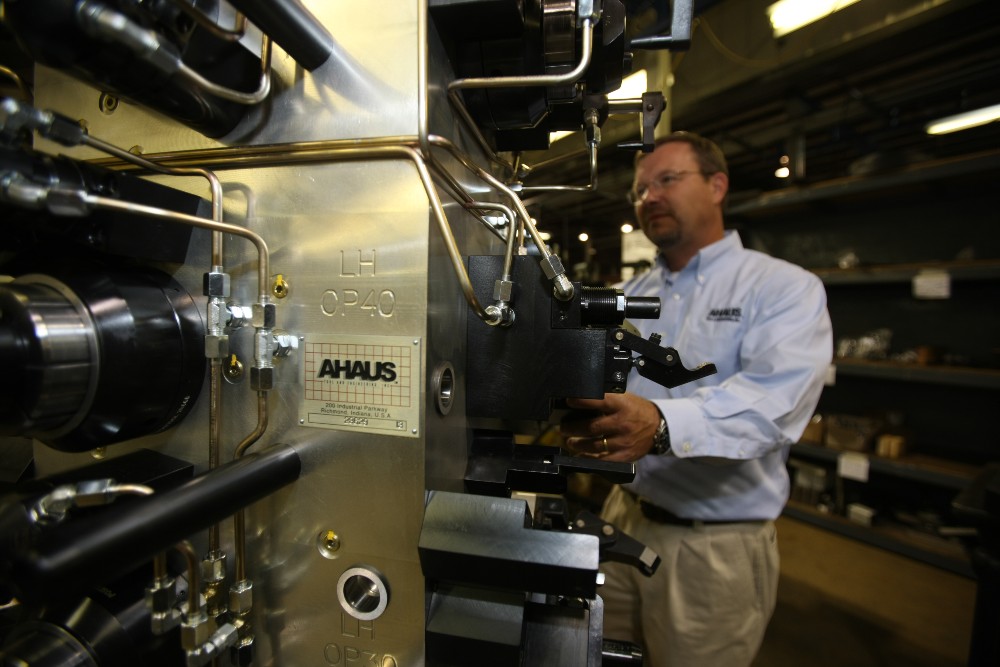
They are required to earn a two-year associate degree to complete the program. “Many of our key employees are graduates,” Rick Ahaus notes.
The program allows a critical opportunity to evaluate them. The apprentices have to have a core competency in a lot of areas to be hired permanently.
“There’s far more of an emphasis on the engineering side. That’s a big change,” Ahaus says. “The training has changed from understanding a lathe to running sophisticated equipment. They might take a project, develop it, design it and take it to a customer’s plant and install it.”
Kevin Ahaus says more changes are coming, yet there are still some basic employee traits that always have meaning: “We are the looking for dependable — and drug-free — people capable of learning advanced manufacturing skills (machining and tool-and-die making), PLC programming, robot programming and design,” he says. “This will be key to future growth and productivity at Ahaus.”